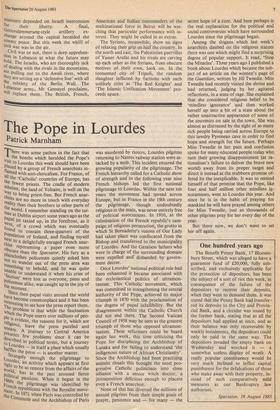The Pope in Lourdes
Patrick Marnham
There was some pathos in the fact that visit to Lourdes this week should have been Placed by a group of French anarchists in- 'lamed with anti-clericalism. For France, of all the 'Catholic' countries of Europe, has the fewest priests. The cradle of modern atheism, the land of Voltaire, is well on the way to being priest-free. But French anar- chists are no more in touch with everyday reality than their brothers in other parts of the world. I remember standing on the tar- mac at Dublin airport some years ago as the Papal jet taxied up, in the forefront, as it were, of a crowd which was eventually found to contain three-quarters of the Population of Ireland, and finding myself next to a delightfully enraged French anar- chist representing a paper even more obscure than the Spectator. His fury as a Plainclothes policeman quietly asked him not to wander out of the press area was something to behold, and he was quite ?liable to understand it when his cries of fascism' were lost as everyone, press and Policemen alike, was caught up in the joy of the Moment. Since then papal visits around the world have become commonplace and it has been interesting to see how the press report them. 1 he problem is that while the fascination hich the Pope exerts over millions of peo- ple is evident, the reasons for it, which are religious, leave the press puzzled and "easy. A journey to Central America Presents few problems since it can be described in political terms, but a journey
Lourdes — in itself a place which usually baffles the press — is another matter.
sStrangely enough the pilgrimage to °11rdes, an activity which appears at first ght to be so remote from the affairs of the world, has in the past aroused fierce political passions. When it began in the French the pilgrimage was identified by t' tench republicans with the Royalist move- ment. In 1871 when Paris was controlled by me Commune and the Archbishop of Paris was murdered by rioters, Lourdes pilgrims returning to Nantes railway station were at- tacked by a mob. This incident ensured the growing popularity of the pilgrimage. The French hierarchy called for a Catholic show of strength and in the following year nine French bishops led the first national pilgrimage to Lourdes. Within the next ten years the movement had spread across Europe, but in France in the 19th century the pilgrimage, though undoubtedly religious in the main, was never entirely free of political associations. In 1910, at the culmination of the French republic's cam- paign of religious persecution, the grotto in which St Bernadette's visions of Our Lady had taken place was confiscated from the Bishop and transferred to the municipality of Lourdes. And the Garaison fathers who were in charge of the surrounding domain were expelled and disbanded by govern- ment decree.
Once Lourdes' national political role had been exhausted it became associated with the ecclesiastical politics of ultramon- tanism. This Catholic movement,, which was committed to strengthening the central authority of the Pope, achieved its major triumph in 1870 with the proclamation of the dogma of papal infallibility. But the disagreement within the Catholic Church did not end there. The Second Vatican Council of 1958 may be seen as the greatest triumph of those who opposed ultramon- tanism. These reformers could be heard again last week, this time criticising the Pope for disciplining the Archbishop of Lusaka and for failing to understand 'the indigenous nature of African Christianity'. Since the Archbishop had been practising animist rituals this brought the most pro- gressive Catholic politicians into close alliance with a senior witch doctor, a juxtaposition delicious enough to placate even a French anarchist.
None of this has diverted the millions of annual pilgrims from their simple goals of prayer, penitence and — for many — the secret hope of a cure. And here perhaps is the real explanation for the political and social controversies which have surrounded Lourdes since the pilgrimage began.
Among the slogans which last week's anarchists daubed on the religious statues there was one which might find a surprising degree of popular support. It read, 'Stop the Miracles'. Three years ago I published a book about Lourdes which became the sub- ject of an article on the women's page of the Guardian, written by Jill Tweedie. Miss Tweedie had recently visited the shrine and had returned, judging by her agitated reflections, in a state of rage. She explained that she considered religious belief to be 'mindless ignorance' and then worked herself up into a bit of a state about the rather unattractive appearance of some of the souvenirs on sale in the town. She was almost as distressed by the sight of so many sick people being carried across Europe to this tawdry Pyrenean cave in order to find hope and strength for the future. Perhaps Miss Tweedie in her pain and confusion spoke for many educated people today who turn their growing disappointment (at ra- tionalism's failure to deliver the brave new world) away from its proper target and direct it instead at the stubborn promise of- fered by the inexplicable. It was to remind himself of that promise that the Pope, like four and half million other mindless ig- noramuses, went to Lourdes this year. And since he is in the habit of praying for mankind he will have prayed among others for Miss Tweedie, just as thousands of other pilgrims pray for her every day of the year.
But there now, we don't want to set her off again.


































 Previous page
Previous page